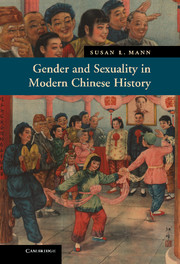Book contents
- Frontmatter
- Contents
- Figures
- Acknowledgments
- Preface: Does Sex Have a History?
- Introduction: The cloistered lady and the bare stick
- Part I Gender, Sexuality, and the State
- PART II GENDER, SEXUALITY, AND THE BODY
- Part III Gender, Sexuality, and the Other
- 7 Same-sex relationships and transgendered performance
- 8 Sexuality in the creative imagination
- 9 Sexuality and the Other
- Conclusion: Gender, sexuality, and citizenship
- Afterword: Gender and sexuality: useful categories of historical analysis?
- Permissions
- References
- Index
Conclusion: Gender, sexuality, and citizenship
from Part III - Gender, Sexuality, and the Other
Published online by Cambridge University Press: 05 June 2012
- Frontmatter
- Contents
- Figures
- Acknowledgments
- Preface: Does Sex Have a History?
- Introduction: The cloistered lady and the bare stick
- Part I Gender, Sexuality, and the State
- PART II GENDER, SEXUALITY, AND THE BODY
- Part III Gender, Sexuality, and the Other
- 7 Same-sex relationships and transgendered performance
- 8 Sexuality in the creative imagination
- 9 Sexuality and the Other
- Conclusion: Gender, sexuality, and citizenship
- Afterword: Gender and sexuality: useful categories of historical analysis?
- Permissions
- References
- Index
Summary
Of course, there are some men and women who, for the sake of idle pleasures, are unwilling to take on the responsibility of having children; such people should be educated in socialist morals, to make them understand that bringing up children is a parental responsibility, and is also every citizen's duty to the state.
Zhongguo funü (Women of China), 1955 (Evans 1995:368)
Sex is a critical site where the normalizations of cultural citizenship are being reformulated. If the passion to pursue the meaningfulness of sexual desire propels Chinese men into transnational networks, it also lies at the heart of cultural citizenship. Cultural citizenship, perhaps more so than legal subjectivity or theories of psychological personality, establishes proper and improper sex in postsocialist China.
Lisa Rofel (2007:95)
Citizens of the People's Republic of China, no longer subjects of the old imperial regime, embody notions of gender and sexuality with deep roots in the past. Even in the gay community that has grown in major urban centers, powerful affinities for family and kinship continue to dominate nascent sexual identities. The most important link that embodied citizens share with their late imperial ancestors lies in the connection between childrearing and loyalty to the government. The Qing government installed Mencian Confucianism as the prevailing orthodoxy, and it was Mencius who declared that not having a son was the most unfilial act of all. A son's foremost obligation to his parents was to have a son of his own to continue the family line. Similarly, to “seek a loyal subject in a filial son” was a maxim of late imperial governance, and the Qing court campaigned relentlessly to anchor all male subjects firmly in families in which they could be properly socialized as orderly subjects. China's Communist government remains firmly committed to family-based citizenship, particularly in the post-Mao era.
In a family-based polity, childbearing and childrearing are the tasks of mothers, whose privileged role was vaunted and protected by late imperial policies. The Qing court bestowed honorific titles on mothers and grandmothers of successful officials. Literati memoirs never failed to pay homage to the guidance and sacrifice of mothers. And the vast medical corpus devoted to “women's medicine” elaborated the formulae and protocols for conceiving, carrying, and delivering healthy babies, especially boys (Yi-Li Wu 2010). A mother's moral character as well as her education shaped her ability to nurture a fetus, as detailed prescriptions for taijiao (fetal instruction) show. In that sense, a woman's fidelity to her husband's family was an integral part of her pledge of loyalty to the government. It bound her to bear and rear the offspring of the next generation, to carry on the family line and supply subjects loyal to the state – or, failing that, to supply her husband with a concubine who would bear sons for her, or see to the adoption of an heir in the event of her husband's untimely death.
- Type
- Chapter
- Information
- Gender and Sexuality in Modern Chinese History , pp. 186 - 198Publisher: Cambridge University PressPrint publication year: 2011



